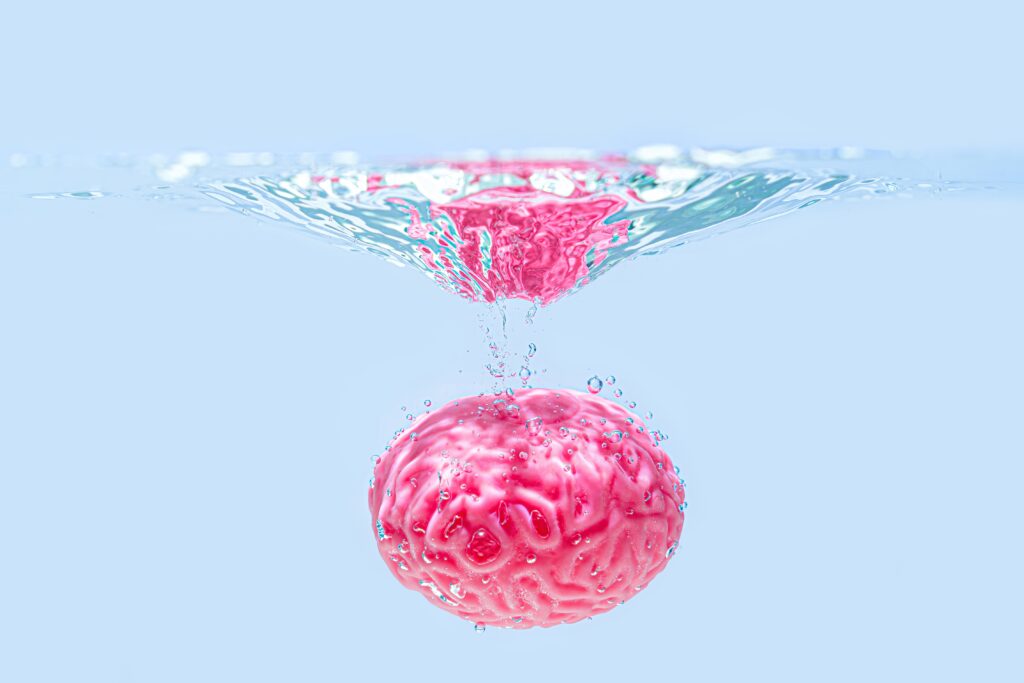From social isolation to life-threatening liver damage, long-term alcohol abuse can lead to a range of devastating consequences. One of the most severe physical risks of alcohol abuse is wet brain syndrome, or Wernicke-Korsakoff syndrome (WKS), a permanent form of brain damage caused by a vitamin B1 (thiamine) deficiency.
While many alcohol-related health issues can be reversed with treatment and sobriety, WKS is irreversible once it progresses beyond the early stages. Untreated, it can result in severe cognitive impairment, coordination issues, and hallucinations.
This article will explore the causes, symptoms, and treatment options for wet brain syndrome, highlighting the importance of early detection and intervention.
Get help for alcohol use disorder at La Fuente. Call us at 888.903.9898.
What Is Wet Brain Syndrome?
“Wet brain” or “wet brain syndrome” are informal terms that refer to two closely related conditions: Wernicke’s encephalopathy and Korsakoff’s psychosis. Together, these conditions are known as Wernicke-Korsakoff syndrome (sometimes shortened to WKS).
Wernicke-Korsakoff syndrome is a type of dementia or cognitive impairment caused by a thiamine deficiency, also known as vitamin B1.
Thiamine is essential for the proper functioning of every tissue in the body. It must be obtained from the diet because the body doesn’t produce it naturally. After eating, thiamine is stored in the liver for later use.
Foods rich in thiamine include:
- Pork
- Beef
- Cereals
- Asparagus
- Eggs
- Potatoes
- Oranges
- Kale
- Cauliflower
- Some types of rice
A thiamine deficiency can be caused by factors such as malnutrition, prolonged vomiting, eating disorders, and chemotherapy. However, in affluent countries, chronic alcohol abuse is the leading cause.
Heavy alcohol consumption leads to thiamine deficiency for several reasons. It interferes with the absorption of thiamine in the intestine and depletes the liver’s stored thiamine. Additionally, people struggling with alcohol addiction often neglect a balanced diet. Plus, alcohol-induced stomach irritation can lead to vomiting or loss of appetite, further draining the body’s thiamine reserves.
What Are the Symptoms of Wet Brain?
Wet brain syndrome is a form of dementia that primarily affects chronic, long-term alcoholics at the end stages of their disease. The illness occurs in two separate stages.
Stage 1: Wernicke Encephalopathy
The first stage is called Wernicke encephalopathy (WE), a short-term neurological disorder caused by brain lesions in the thalamus and hypothalamus.
The three main symptoms of WE are mental confusion and apathy, loss of muscle coordination while standing or walking, and eye movement dysfunction or vision disturbances. Although these are the primary signs of WE, a person doesn’t need to exhibit all three to be diagnosed with the disorder.
Other possible symptoms include:
- Poor reflexes
- Changes in heart rate
- Muscle weakness
- Confusion and cognitive difficulties
If WE is recognized and treated promptly, its effects may be reversible, and the patient could potentially regain normal functioning.
Stage 2: Korsakoff Psychosis
Unfortunately, Wernicke encephalopathy often goes untreated, leading to the development of Korsakoff psychosis, a severe form of neuropsychiatric dementia. This condition is sometimes referred to as “alcoholic dementia” or “alcohol amnestic disorder.”
The National Institute on Alcohol Abuse and Alcoholism reports that 80 to 90% of individuals with Wernicke encephalopathy eventually develop Korsakoff psychosis.
Symptoms of Korsakoff psychosis include:
- Memory loss (retrograde amnesia)
- Trouble forming new memories (anterograde amnesia)
- Hallucinations
- Impaired coordination and balance
- Trouble walking
- Agitation and anger
- Vision problems
- Disorientation
- Confusion
- Personality changes
- Inability to care for oneself
Treatment can help manage symptoms in the advanced stages of wet brain syndrome, but the brain damage caused by alcohol is severe and irreversible. Patients with Korsakoff psychosis may become unable to care for themselves, and without treatment, the condition can be fatal.
Treatment for Wet Brain Syndrome
Treatment for wet brain syndrome isn’t one-size-fits-all. Treatment plans vary depending on the patient’s symptoms, the severity of the condition, and co-occurring issues like psychosis or other psychiatric disorders.
It’s also worth noting that wet brain syndrome isn’t curable. However, early detection can help manage symptoms and slow the disease’s progression.
With that said, treating Wernicke’s encephalopathy usually begins with increasing thiamine intake. Doctors may recommend a more balanced diet rich in vitamin B1, in addition to adding oral or injectable vitamin supplements.
Thiamine supplementation can help alleviate symptoms like confusion, delirium, vision issues, and muscle coordination problems. However, additional medications might be necessary to address other symptoms.
Ultimately, abstaining from alcohol is the most crucial intervention to prevent the disease from progressing into Korsakoff psychosis.
If a patient’s condition has already progressed into Korsakoff’s psychosis, treatment may include vitamin B1 replacement therapy, oral supplements, and proper nutrition and hydration.
Additionally, memory rehabilitation therapies, similar to those used for other forms of dementia, can help individuals manage their symptoms. However, in more severe cases, residential care may be necessary.
Take Back Control of Your Life at La Fuente Hollywood Treatment Center
Early detection and intervention are crucial to managing symptoms and preventing the progression of Wernicke-Korsakoff syndrome. The best way to protect yourself or a loved one from this devastating condition is to quit alcohol and seek professional treatment.
At La Fuente Hollywood Treatment Center, we understand the challenges of overcoming alcohol addiction. We offer comprehensive care that begins with supervised medical detox to safely manage withdrawal symptoms. Our residential rehab program provides a supportive environment for recovery, while our outpatient programs offer continued support and therapy as you transition back into daily life.
Taking the first step to quitting alcohol is the most critical action you can take to prevent the onset of WKS. With the right treatment and support, recovery is possible, and you can reclaim a healthier, more fulfilling life.
Get the help you need at La Fuente. Call us at 888.903.9898.




